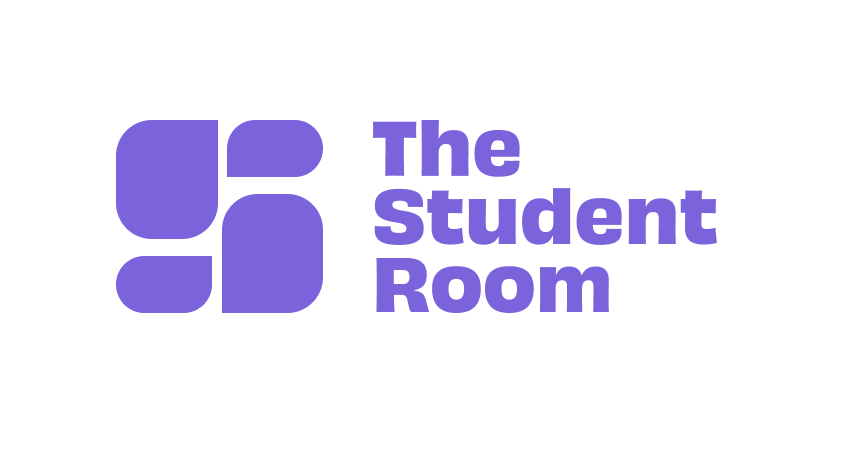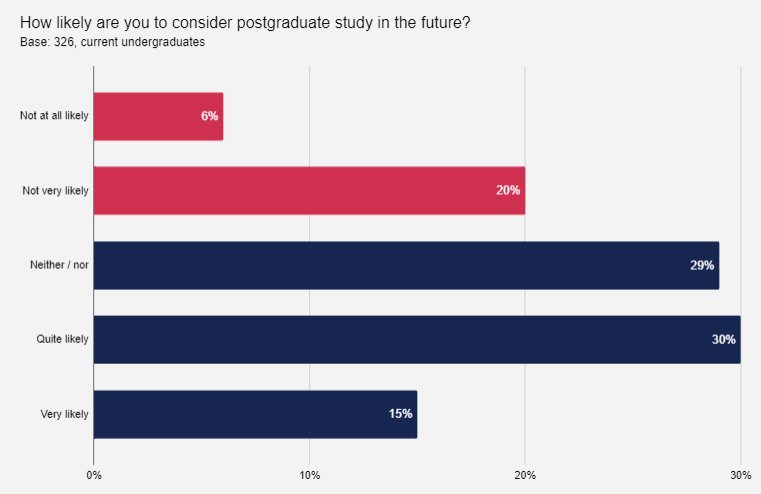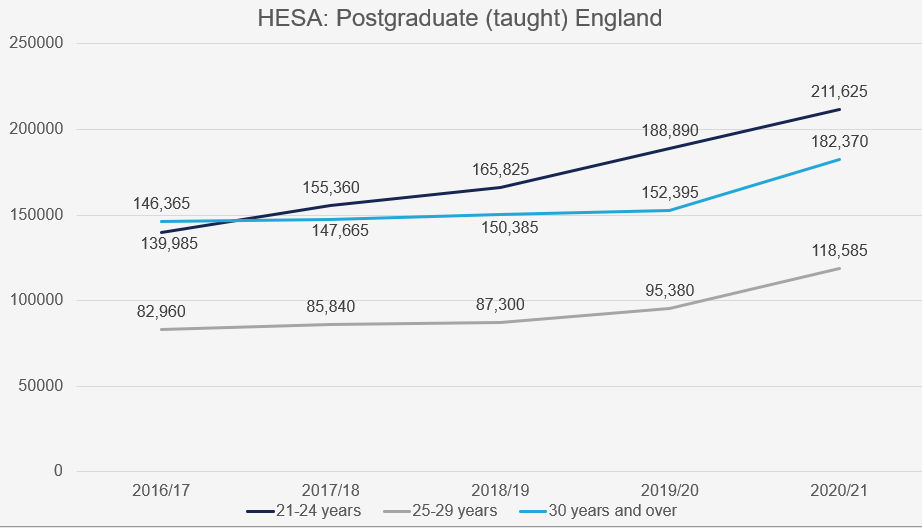Last year the pandemic caused a seismic shift in postgraduate numbers. As we come out of the other side, what does the future hold for postgraduate recruitment? Will we return to pre-pandemic trends or settle into a new normal?
In March we launched the Big Spring Term Survey to gather young people’s views on a range of topics relating to student life and education. The responses from current undergraduates showed that there are huge opportunities for universities to increase postgraduate numbers by helping applicants to understand their options.
Who is interested in postgraduate study?
Undergraduates
45% of current undergraduates we surveyed told us they were either ‘quite likely‘ or ‘very likely‘ to consider postgraduate study in the future. If fewer than 45% of your students are converting to postgraduates, this is a good place to start.
10% of all posts in our postgraduate applications forum and 11% of member pageviews came from third-year university students. Although considerably smaller, we do also get traffic from first and second-year students who are beginning the consideration journey (29,000 pageviews a year), so there is a good case for early engagement here.
How old are postgraduate applicants?
For the last four cycles, around 40% of domestic postgraduates (taught) were aged 21 – 24 and 58% were over 25.
On The Student Room, 81% of member pageviews to our postgraduate applications forum come from students aged 22 or older, suggesting that for the remaining 19% postgraduate consideration can start years before the application stage.
The pandemic also pushed older learners into postgraduate study in the 2020/21 cycle. With huge disruption in the labour market, they came to upskill, retrain, or because they had lost their jobs.
Year-on-year growth in postgraduate numbers for those aged 30+ is usually only a percentage point or two; however, in the 2020/21 cycle, numbers grew by 20%. Similarly, for the 25-29-year-olds, growth was way above trend at 24% in 2020/21.
(Unknown age and aged 20 or under excluded. HESA data)
While the lifelong learning entitlement may help more mature students to access courses in the future, this surge in interest may be short-lived with restrictions ending and people heading back to work. Universities may need to work harder this year to recruit the same numbers.
Cost is (still) the biggest deterrent for prospective postgraduates
Which, if any, of the following concerns do you have about postgraduate study? Please select all that apply (320 responses, current undergraduates)
- The cost of tuition fees (70%)
- Being unable to cope with the level of study (58%)
- Loss of earnings while studying (58%)
- The delay in entering the workforce (48%)
- Balancing study with work/family (40%)
Alternative answers they could have selected were: Choosing the right course (34%), Going to a different uni (31%), Meeting new people/fitting in (30%) Starting a new course in a new subject (23%), None of the above (8%) or Other (1%)
“The lack of support and not enough guidance on assessed work”
“It is so expensive and I have no idea how I could possibly afford it?!”
“Living costs”
We’ve been saying it for years and years, but finances play a major role in postgraduate decision-making.
For undergraduates finishing their degrees the financial hit is a double whammy – postgraduate study means accumulating more debt in the short term and forgoing the chance to earn money by starting work.
This is why it is so important to emphasise return-on-investment and employability outcomes, but our research shows this is an area universities urgently need to improve. Just 64% of current undergraduates we surveyed said that they were happy with how their university has approached providing careers support.
Having said all this, even for prospective applicants who do see the long-term benefits of postgraduate study, affordability could still be a barrier. The maximum government loan available to masters students is currently £11,570 – for both tuition and living costs. As masters students can expect to pay in the region of £8,500 – £10,000+ for tuition, this leaves almost nothing to cover accommodation, food, utilities or general living costs.

Postgraduate applicants need much more guidance
Another significant barrier is lack of awareness. The survey results showed that the vast majority of current undergraduates do not feel fully informed about postgraduate study (24% said they felt ‘not at all informed’).
Only 4% of respondents said they felt ‘very informed’, which shows that there is a huge opportunity for universities to educate current undergraduates (including their own students) about options to continue their studies.
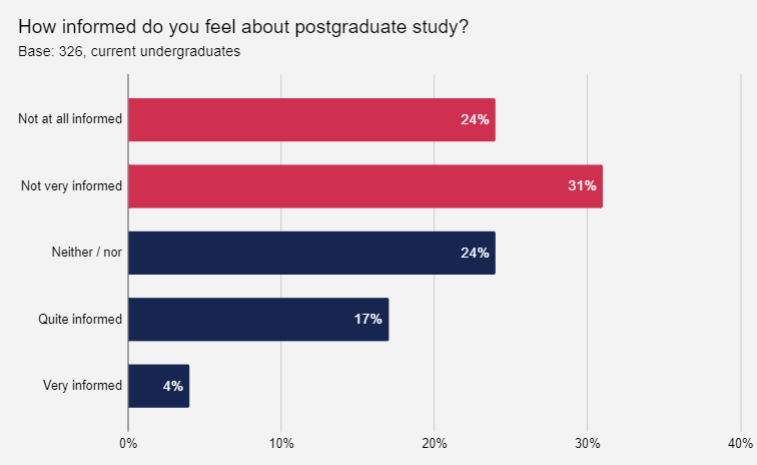
We also asked respondents to tell us whether they understood how to apply for postgraduate courses and how to get funding for their studies. Only around one in five respondents understood how to apply, but even fewer knew how to get funding (14%):
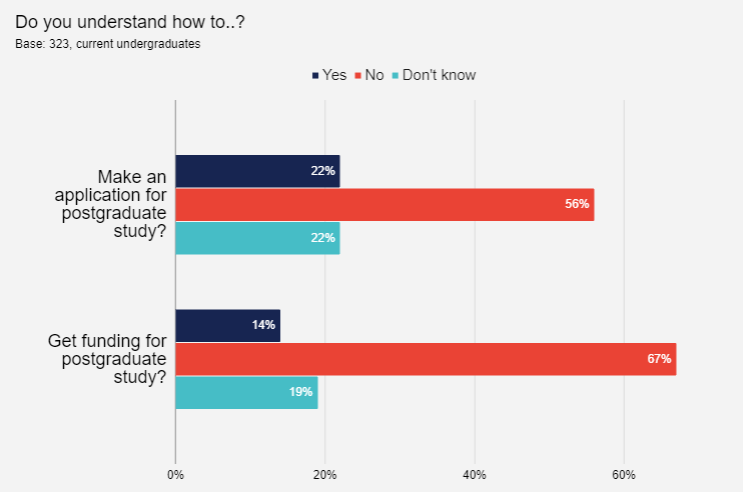
It’s hardly surprising that current students are so worried about tuition and living costs in view of how little awareness they have around postgraduate funding options.
What students are saying in our postgraduate forums this month
We’ve seen plenty of interest in high tariff universities (such as Oxbridge, LSE and UCL), with many students talking about interviews, application and course decisions:
- “Still waiting for postgraduate application decisions“
- “I received an email today…saying that I have been recommended for admission. Someone can explain to me what it means?”
- “Hello! Have you applied to MSc in Education at Uni of Oxford in 2022? If yes, have you heard back yet?”
- “I’m thinking about applying for Psychology and Counselling in uni…has anyone …found that there isn’t a lot of employment opportunities out there?…I don’t want to study the undergraduate degree and then can’t get onto the masters.“
- “I’ve heard that some people are already being invited for interviews. Anyone on here heard about their application yet?”
We also see a lot of funding-related questions:
- The Official Funding questions/moans/possible joy Thread
- “I’m looking at applying for an ecology based masters. I don’t understand how the finance works – if I only get finance for say £11,000 wouldn’t that have to go straight to the course? How do people afford to live? Can’t say I’d want to try and work whilst doing a masters and travelling in.”
- “Can you pay for two postgraduate offer deposits?“
- “Do I qualify for home fees?”
Our top tips for what to do next
- Target your own students, undergraduates and career changers (but expect to work harder for mature students this cycle)
- Offer extensive advice about funding postgraduate study – why not ask current postgraduate students to share how they have managed their finances with prospective applicants? Signposting scholarships or bursaries is also a great idea.
- Make sure your postgraduate application process is clear and easy to find – include the application deadlines, interview dates, and any tasks that applicants may be expected to prepare
- Link up with employers – do you have contacts with high-profile employers (especially those who ask for postgraduate qualifications on job applications?) Help prospective postgraduates to build connections with them so that they have a better chance of getting a job after studying with you.
- Keep communicating with applicants while they await your decision – we see a lot of panicked threads from students who are waiting for decisions, so be kind and manage their expectations as much as possible
- Further research – TSR Insight can help you to understand the postgraduate market you are missing and help you to identify growth opportunities
Our prospective postgraduate audience
The Student Room is ideal for your postgraduate campaign.
Annual users
- 18M – aged 25+
- 11M – aged 22-24
- 4.6M – 3rd-year uni
Postgraduate applications forum (in last 12 months):
- 3M pageviews
- 13,224 posts
- 804,646 estimated visitors
We can target students who are actively engaging with content relating to postgraduate study or the courses you want to promote.
Get in touch:
0800 999 3222
hello@thestudentroom.com
Sources
HESA: Who’s studying in HE? [Accessed March 2022]
TSR’s Big Spring Term Survey (Navigating Changing Options March 2022, TSR Insight)
Google analytics, The Student Room activity (data taken: 24th March 2022)
